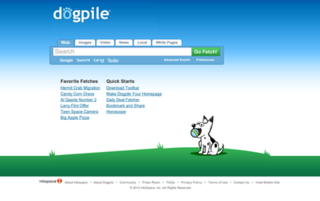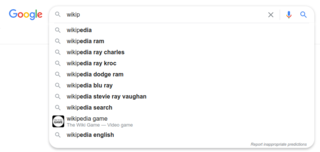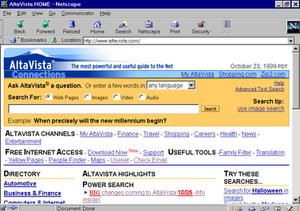
Lycos, Inc., is a web search engine and web portal established in 1994, spun out of Carnegie Mellon University. Lycos also encompasses a network of email, web hosting, social networking, and entertainment websites. The company is based in Waltham, Massachusetts, and is a subsidiary of Ybrant Digital.

robots.txt is the filename used for implementing the Robots Exclusion Protocol, a standard used by websites to indicate to visiting web crawlers and other web robots which portions of the website they are allowed to visit.

Yahoo! Babel Fish was a free Web-based multilingual machine translation service of Yahoo! site. In May 2012 it was replaced by Bing Translator, to which queries were redirected. Although Yahoo! has transitioned its Babel Fish translation services to Bing Translator, it did not sell its translation application to Microsoft outright. As the oldest free online language translator, the service translated text or Web pages in 36 pairs between 13 languages, including English, Simplified Chinese, Traditional Chinese, Dutch, French, German, Greek, Italian, Japanese, Korean, Portuguese, Russian, and Spanish.

Excite is an American website operated by IAC that provides outsourced internet content such as a metasearch engine, with outsourced weather and news content on the main page. As of 2024, all of Excite's operations are controlled by services outside of the business.

Dogpile is a metasearch engine for information on the World Wide Web that fetches results from Google, Yahoo!, Yandex, Bing, and other popular search engines, including those from audio and video content providers such as Yahoo!.

HotBot is a Canadian web search engine owned by HotBot Limited, whose key principal is Kristen Richardson. According to the website itself, the current domain has been relaunched in 2022 under new ownership and with a different technology.
Yahoo! Japan is a Japanese web portal. Its search engine was the most-visited website in Japan, nearing monopolistic status.
Yahoo! Native is a native "Pay per click" Internet advertising service provided by Yahoo.
Yahoo! Search is a search engine owned and operated by Yahoo!, using Microsoft Bing to power results.
AltaVista is search engine company, which is now owned by Yahoo!.

Andrei Zary Broder is a distinguished scientist at Google. Previously, he was a research fellow and vice president of computational advertising for Yahoo!, and before that, the vice president of research for AltaVista. He has also worked for IBM Research as a distinguished engineer and was CTO of IBM's Institute for Search and Text Analysis.

Go.com is a portal for Disney content that was created after The Walt Disney Company acquired the search engine Infoseek. Go.com is operated by Disney Interactive’s Disney Online. It began as a web portal launched by Jeff Gold. Go.com includes content from ABC News, which is owned by Walt Disney Television and is hosted under a .go.com name. Along with Time Warner's Pathfinder.com, Go.com proved to be an expensive failure for its parent company, as web users largely preferred to use search engines to access content directly, rather than using directories. In 2013, the site was transitioned from a general-interest portal to a simple landing page.

A search engine is a software system that provides hyperlinks to web pages and other relevant information on the Web in response to a user's query. The user inputs a query within a web browser or a mobile app, and the search results are often a list of hyperlinks, accompanied by textual summaries and images. Users also have the option of limiting the search to a specific type of results, such as images, videos, or news.

Steel Connect, Inc. is an American company that provides supply chain management services to software companies.

BTJunkie was a BitTorrent web search engine operating between 2005 and 2012. It used a web crawler to search for torrent files from other torrent sites and store them on its database. It had nearly 4,000,000 active torrents and about 4,200 torrents added daily, making it the largest torrent site indexer on the web in 2006. During 2011, BTJunkie was the 5th most popular BitTorrent site.
MetaCrawler is a search engine. It is a registered trademark of InfoSpace and was created by Erik Selberg.
Agora was a World Wide Web email browser and was a proof of concept to help people to use the full internet. Agora was an email-based web browser designed for non-graphic terminals and to help people without full access to the internet such as in developing countries or without a permanent internet connection. Similar to W3Gate, Agora was a server application designed to fetch HTML documents through e-mail rather than http.
Zip2 Corp. was a company that provided and licensed online city guide software to newspapers. The company was founded in Palo Alto, California as Global Link Information Network, Inc. on November 9, 1995, by Greg Kouri and brothers Elon and Kimbal Musk. Initially, Global Link provided local businesses with an Internet presence, but later began to assist newspapers in designing online city guides before being purchased by Compaq Computer in 2000.












